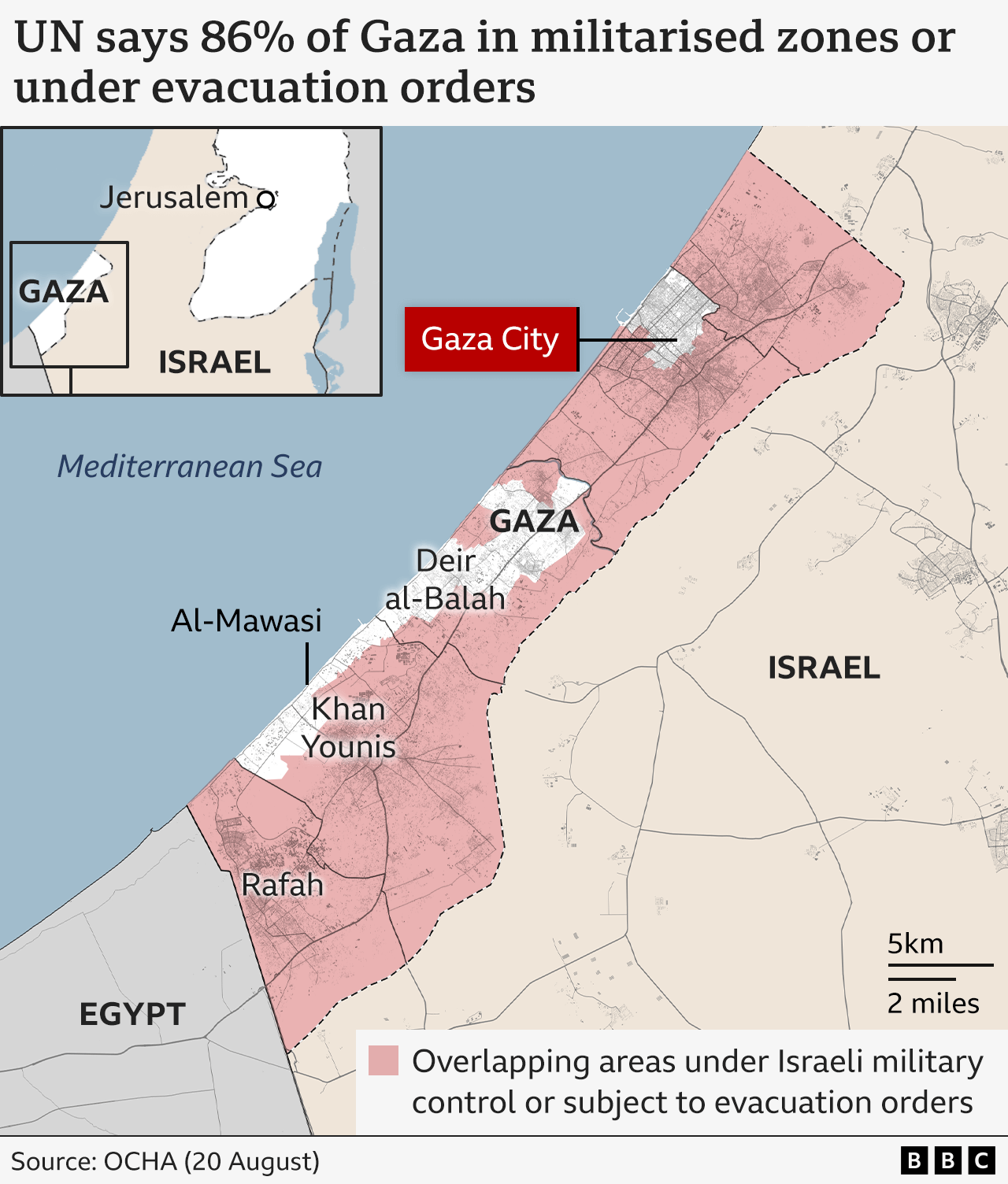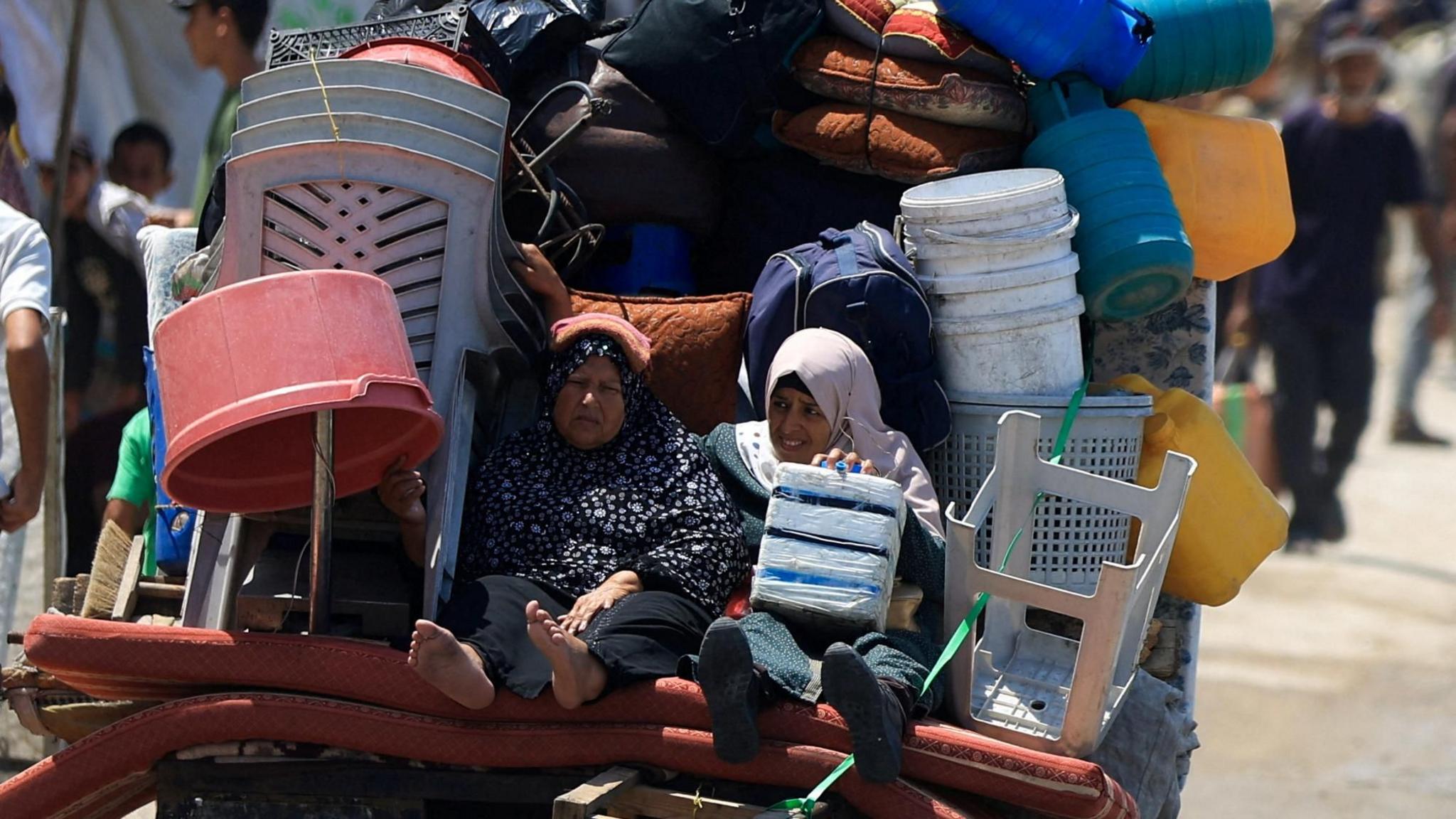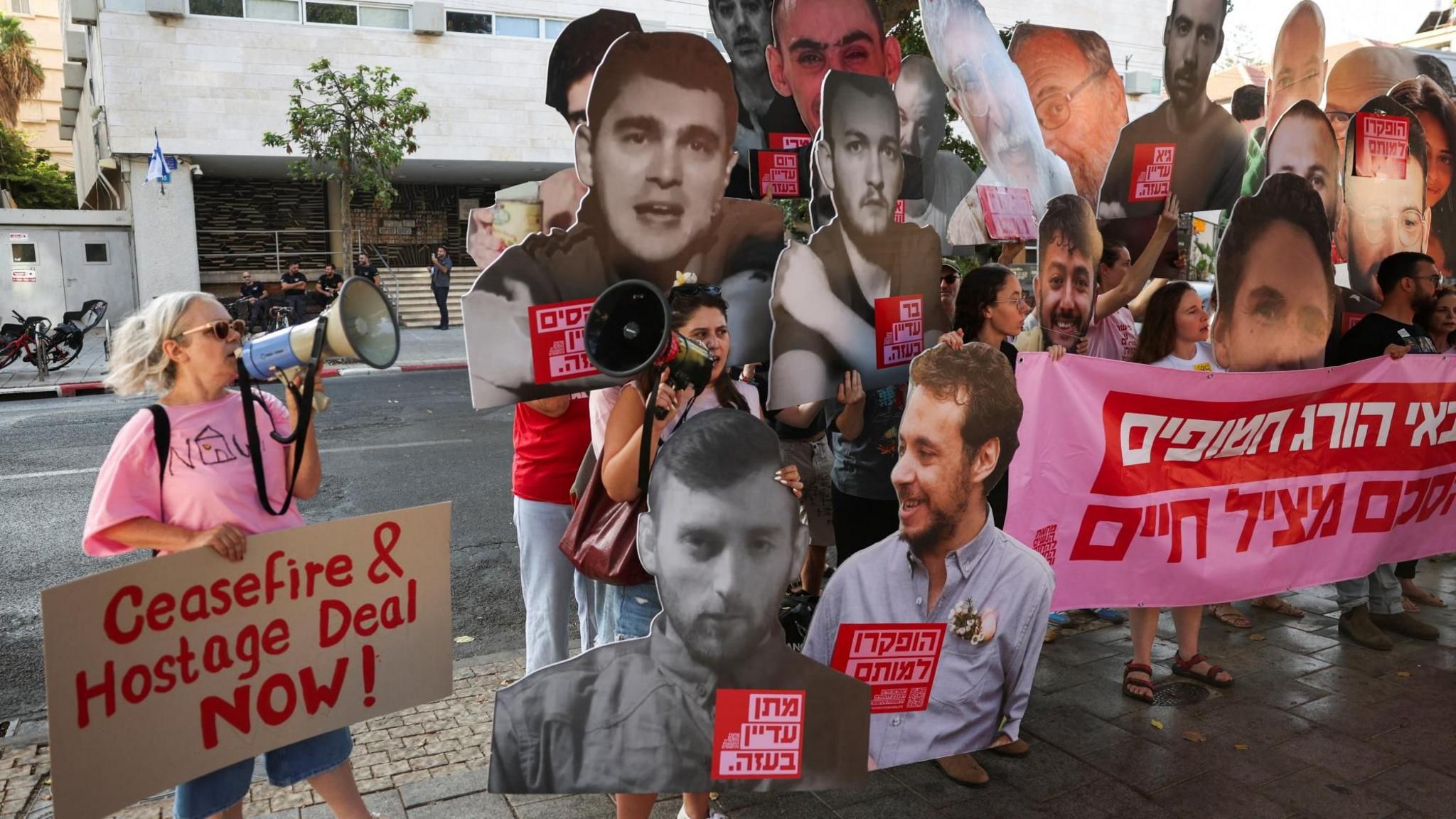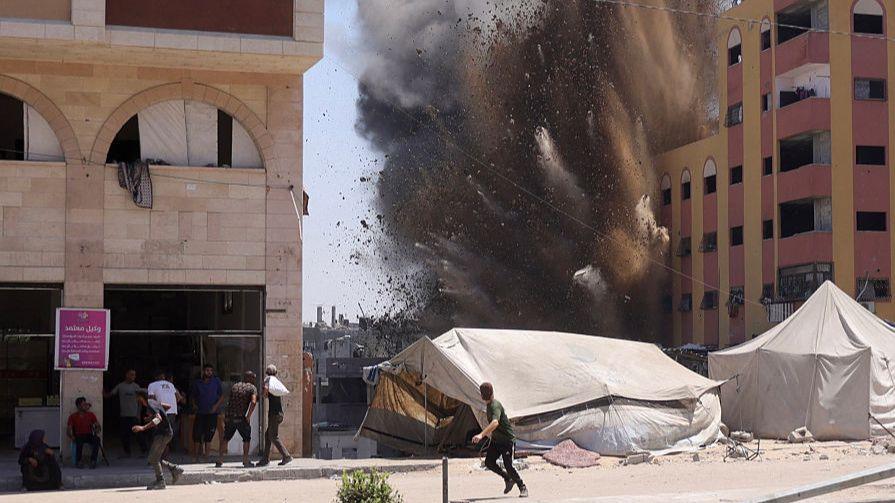Israel tells medics and aid groups to prepare for Gaza City evacuation

- Published
Israel's military says it has warned medical officials and international organisations to prepare for the planned evacuation of Gaza City's one million residents ahead of an offensive to occupy it.
The officials were told that "adjustments" were being made to hospitals in southern Gaza to receive patients, a statement said.
Gaza's Hamas-run health ministry rejected "any step that would undermine what remains of the health system". The UN and aid groups have also vowed to stay to help those who cannot or choose not to move.
Meanwhile, Palestinians said there had been heavy bombardment in eastern areas of the city, a day after the military said it had taken the first steps in the offensive.
Israeli Prime Minister Benjamin Netanyahu is meeting security officials on Thursday to approve the military's takeover plans despite widespread international and domestic opposition.
He announced Israel's intention to conquer the entire Gaza Strip after indirect talks with Hamas on a ceasefire and hostage release deal broke down last month.

The Israeli military plans to evacuate Gaza City's entire population and move it to shelters in the south before troops move into the territory's largest urban area.
As part of its preparations, it said, officers from military body Cogat carried out "initial warning calls" to medical officials and international organisations on Tuesday.
"The officers emphasised to the medical officials that adjustments are being made to the hospital infrastructure in the south of the Strip to receive the sick and wounded, alongside an increased entry of necessary medical equipment," a statement said.
It quoted the officers as telling them in the calls: "We are going to provide you with a place to be in, whether it is a field hospital or any other hospital."
However, Gaza's health ministry expressed its "rejection of any step that would undermine what remains of the health system after the systematic destruction carried out by the occupation [Israeli] authorities".
"Such a step would deprive more than one million people of their right to medical treatment and expose the lives of residents, patients, and the wounded to imminent danger," it warned.
Eighteen of Gaza's 36 hospitals are currently partially functional, according to the UN. Eleven of them are located in Gaza City governorate and one is in North Gaza governorate.
The UN and non-governmental organisations warned earlier this week that an Israeli offensive in Gaza City would have a "horrific humanitarian impact".
"We reiterate our commitment to serve people wherever they are, and we remain present in Gaza City to provide lifesaving support," they stated.
They also warned that hospitals in the south were "operating at several times their capacity, and taking on patients from the north would have life-threatening consequences".
Motasem Dalloul, a journalist in Gaza City, told the BBC he had seen and heard multiple Israeli air strikes there on Thursday.
"From time to time there are fighter jets which carry out attacks that destroy homes and other facilities, mainly in the eastern side of Gaza City, in Zeitoun neighbourhood and Sabra neighbourhood," he said.
The Hamas-run Civil Defence agency said at least 48 people were killed by Israeli strikes and fire across Gaza on Thursday, including eight in Sabra.
Mr Dalloul also said a "large number" of Israeli drones were flying overhead.
Some were broadcasting messages to residents, telling them to evacuate to "safe zones" in the south of Gaza, he said. But he disputed that such areas were safe, saying people were being killed "in every corner" of the south.
"A lot of people are intending not to move from the city," he said. "They believe that if we will be killed, let's be killed in our homes."

Hundreds of people also joined a rally in Gaza City to demand an end to the war and reject Israel's plan for further displacement.
"We are exhausted. We die a thousand times a day. We don't want to leave, we want to stay here," Bissan Ghazal told the BBC. "Stop the bloodshed. This is enough."
Umm Abdul Rahman Hajjaj said she wanted to tell the Hamas ceasefire negotiators: "What we demand is an immediate end to the war - because the longer it continues, the greater the number of martyrs, wounded, and prisoners".
In Tel Aviv, relatives of Israeli hostages still held by Hamas urged their government to accept a proposed ceasefire deal to bring back some of their loved ones.
"There's a deal on the table. This is the opening we need for a comprehensive deal. We must sign it immediately," said Dalia Cusnir, the sister-in-law of hostage Eitan Horn and released former hostage of Iair Horn.
"Time is running out. The hostages cannot survive much longer in the hand of these brutal captors. We cannot support more fighting."

Hostages' families are urging the Israeli government to agree a deal to end the war and bring home all those held by Hamas
Mediators Qatar and Egypt are trying to secure a deal to avert the offensive and have presented a new proposal for a 60-day truce and the release of around half of the 50 hostages, which Hamas said it had accepted on Monday.
Israel has not yet submitted a formal response, but Israeli officials have said that they would no longer accept a partial deal and demanded a comprehensive one that would see all the hostages released. Only 20 of them are believed to still be alive.
UN Secretary-General António Guterres said it was "vital" to reach an immediate ceasefire and avoid what he called the "inevitable death and destruction" that a new operation in Gaza City would cause.
On Wednesday, an Israeli military spokesman said "the preliminary actions" of the Gaza City offensive had begun and that troops were already "holding the outskirts".
Netanyahu's office said he had "directed that the timetables - for seizing control of the last terrorist strongholds and the defeat of Hamas - be shortened".
Hamas accused the Israeli leader of continuing a "brutal war against innocent civilians in Gaza City" and criticised what it said was his "disregard" for the ceasefire proposal.
The Israeli military launched a campaign in Gaza in response to the Hamas-led attack on southern Israel on 7 October 2023, in which about 1,200 people were killed and 251 others were taken hostage.
At least 62,192 people have been killed in Gaza since then, according to the territory's health ministry. The ministry's figures are quoted by the UN and others as the most reliable source of statistics available on casualties.

